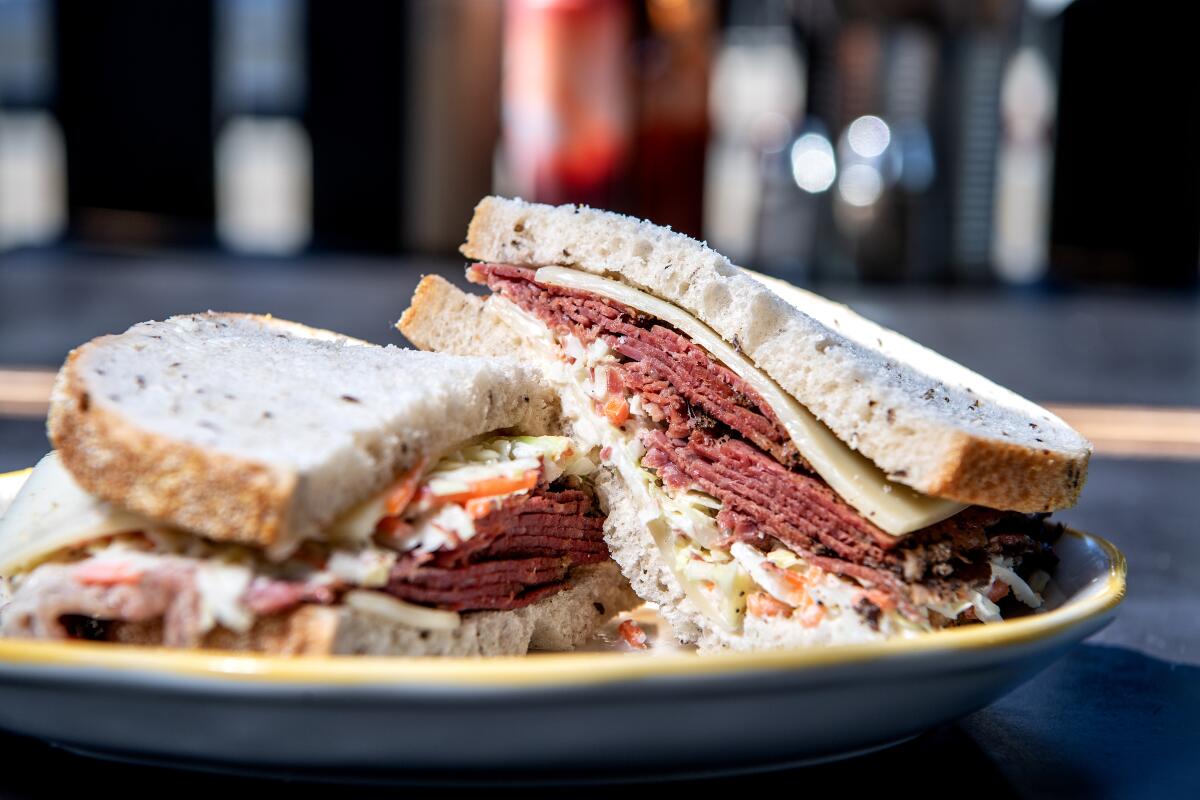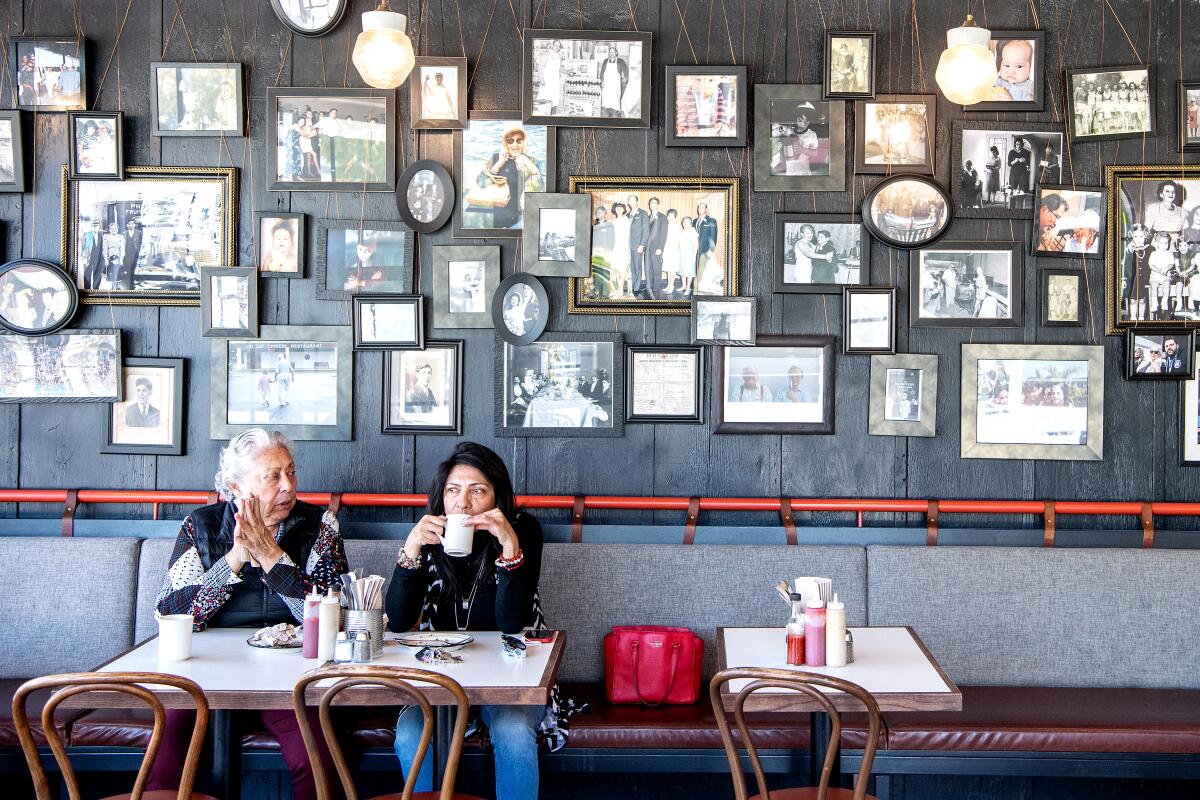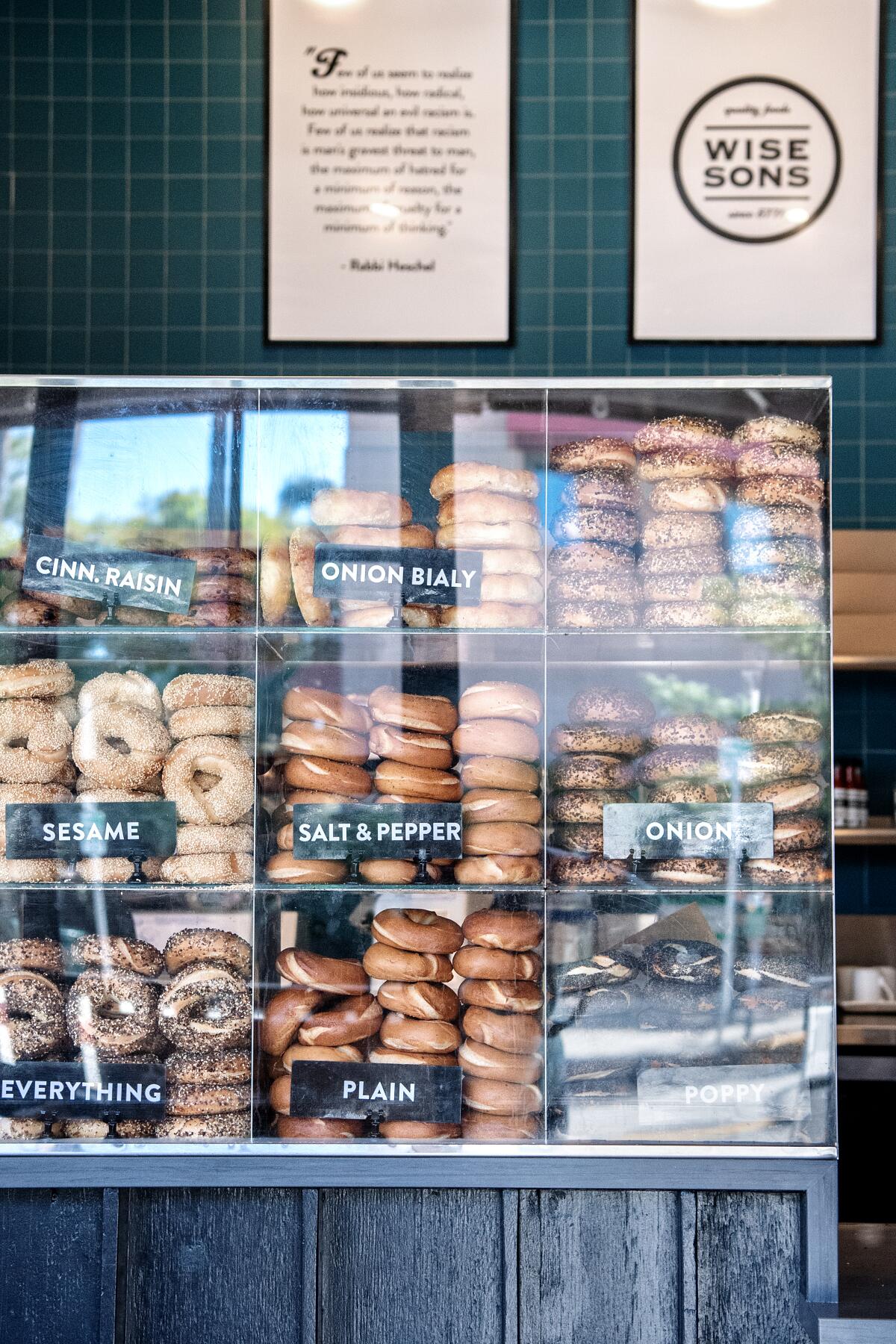How a new generation of Jewish delis and bagel shops is sharing trade secrets

One of the walls at Wise Sons in Culver City is adorned with more than a dozen frames that hold vintage-style pennants. But they’re not a tribute to sports teams of another era; they’re emblazoned with the names of local Jewish delis — from Langer’s to Nate ’n Al’s.
“I grew up eating at many of these spots and wanted to pay respects to those that shaped Wise Sons and have served the local community before we came,” said Evan Bloom, the 35-year-old co-founder.
Bloom, who grew up in Ventura and often visited his grandparents in West Los Angeles, spent his childhood frequenting local restaurants such as the now-closed Junior’s and Pico Kosher delis. He currently lives in the Bay Area (there are six Wise Sons locations in Northern California) but hopes to eventually move back to Southern California, where his family resides. Opening a restaurant in the area was a step toward that goal.
As Bloom was entering the L.A. food space, he stumbled upon a community of new-generation Jewish deli and bagel shop owners such as Nick Schreiber, co-owner of Belle’s Bagels in Highland Park. The two men had been virtual cheerleaders for each other’s businesses on Instagram, but a year ago they became friends. Bloom was working on opening in Culver City, and Schreiber was gearing up to transform his current bagel shop into a deli and bar, which he plans to launch mid-2022.
Now they frequently text each other with details about the best ovens and vendors, or ways to heat pastrami. Schreiber’s team visited Wise Sons in October to learn how the lunch service is run. Bloom stopped by Belle’s to test out a rotating oven; he ended up buying the same one.
“There was this interesting symbiosis, where we were helping them navigate the L.A. landscape and they were helping us navigate the deli landscape at the same time,” said Schreiber, 35.
That willingness to share practical information — even trade secrets — is a mindset associated with many participants in today’s modern Jewish deli movement. They seem to have unknowingly followed in the footsteps of their L.A. predecessors, even taking it to the next level.

L.A.’s traditional deli culture started to bloom in the first half of the 20th century as descendants of Jewish settlers on the East Coast moved West. Some of their restaurants moved as well, including Canter’s Deli, which first opened in New Jersey and relocated to L.A. in 1931.
“In other cities, Jewish deli owners seemed to silently pray for the demise of their competitors, regarding any overtures of camaraderie with outright suspicion,” David Sax wrote in his 2011 book, “Save the Deli: In Search of Perfect Pastrami, Crusty Rye and the Heart of Jewish Delicatessen.” But L.A.’s Jewish deli culture was different.
Today, there’s a sense of solidarity among many of L.A.’s long-standing Jewish deli owners. Jacqueline Canter, co-owner of Canter’s Deli, said she recently shared a meal with her friend and Factor’s Famous Deli co-owner, Suzee Markowitz, as they chatted about their restaurants. Canter’s family has shared and compared notes on brisket recipes with other deli owners — and shared supplies. “Every time another deli runs out of something — let’s just say a deli in the Valley runs out of rye bread — then they call me up and I give them whatever it is they need. All the delis share,” she says.
The same goes for the newer restaurants. Many old-school standbys have shuttered in recent years, such as West Hollywood’s Greenblatt’s Deli, Label’s Table in the Pico-Robertson area and Jerry’s Famous Deli in Marina Del Rey. But new takes on Jewish food have been emerging over the last decade, from places such as Wexler’s Deli in downtown L.A. and Santa Monica, Birdie G’s in Santa Monica and the Bad Jew pop-up. The new chefs and restaurateurs are updating traditional dishes at many levels; Birdie G’s, for example, offers a matzo ball soup with miso.
Wexler’s Deli, one of L.A.’s first modern takes on traditional Jewish food, opened in 2014. From the start, founder Micah Wexler, who has a background in fine dining, used traditional methods to cure and smoke his own pastrami and salmon in-house. “A lot of my generation of deli guys wanted to really take things back to the roots and figure out how to make a lot of these products,” said Wexler, who is no longer involved with the restaurants’ operations. “Whether it was the smoked meats, the smoked fish or the bagels — and take that back to craftsmanship, handmade and house-made kind of thing.”
As the modern Jewish deli food movement evolved in L.A. and people were growing more interested in the craft of making items such as pastrami, smoked fish and bagels in-house, it became commonplace for folks — Bloom and Schreiber among them — to reach out to Wexler to ask questions. “I always tried my best to help them out,” said Wexler, 39.
There seems to be a lot of reaching out. Recently, Rebecca King, who smokes corned pork and pork pastrami under the name the Bad Jew, reached out to Bloom. She’s been doing pop-ups, including selling at Smorgasburg, the downtown food market, and has been wanting to get into the wholesale business. A friend suggested she ask Bloom, who also started his business as a pop-up, for advice.
She brought her smoked meats to Wise Sons, and they talked for an hour and a half. “He sent me his business plan because I’m still so new to the industry,” said King, 32. “He’s been a bit of a mentor and super sweet.”
King also has found camaraderie among other Jewish delis such as the Nosh of Beverly Hills, where she’s held pop-ups, and Birdie G’s, where she staged under chef Joel Spadafore and learned about brining and fermentation.
This willingness to share knowledge has extended into the bagel-making community.

Schreiber is on an ongoing text thread with Jason Kaplan of Maury’s in Silver Lake and Trevor Faris of Hank’s in Burbank and Sherman Oaks, where they share food and business tips. (Schreiber jokingly dubbed them “the Real Bagel Boys of Los Angeles.”) They’ve lent one another bags of flour when delivery orders are short, chatted about the best ways to get seeds to stick to the bagels and even shared starters.
Kaplan recalls a time when Bagel Broker owner Jason Tarnol let him come in to check out a bagel machine at his West Hollywood restaurant. He wanted to carry that spirit of helping others forward.
“Back in the days of one-upmanship in Manhattan, there was a lot of, like, ‘We’ve got the biggest bagels,’” said Kaplan, 53, who used to live in New York. “There was a lot of secrecy in terms of how things were done. You had to join the union, be able to handle a certain number of bagels in an hour — and things were really cutthroat. That’s not how I am. I’m more of a — as Oprah says — ‘run your own race’ [person].”
Kaplan and Faris aren’t afraid to share with each other because they are confident that everyone makes their own distinct bagels. Faris, 37, who’s worked in the food and beer industry for the last decade, has found the bagel community — not just in L.A. but across the country — “unusually supportive”: “There’s just a feeling of community and sharing, like everyone wants everybody else to do well, whereas I’ve worked in other restaurants where it’s felt a little more competitive.”
Wexler believes the openness is something that has been blossoming all over the industry, a stark difference from his earlier days working in restaurants: “Everybody’s still got their bag of tricks that maybe they keep close to the vest, but by and large, people are much more open with communicating with and helping each other out.”
More to Read
Eat your way across L.A.
Get our weekly Tasting Notes newsletter for reviews, news and more.
You may occasionally receive promotional content from the Los Angeles Times.








